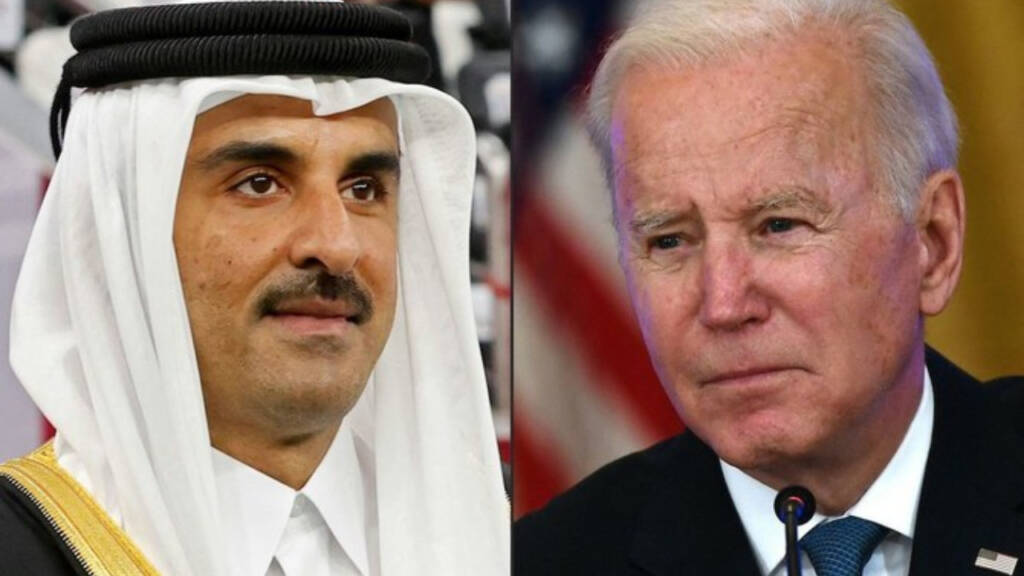Biden’s foreign policy is like rearranging the bedroom furniture, but instead of improving things, it feels like he keeps inviting potential trouble to the sleepover. Qatar’s sudden promotion to BFF status might just be another episode of making buddies without checking if they snore too loudly.
Let’s take a trip down memory lane. Back on January 31st, 2022, just before Russia stormed into Ukraine, President Biden tagged Qatar as a “Major Non-NATO ally” of the US. Before the Ukraine conflict, there was this whole push for Qatar to join the US-NATO gang against Russia as a “close ally.” Biden made it public news before meeting the Emir of Qatar that they were officially on board as a “Major Non-NATO Ally.” This designation is like a VIP pass for countries not in NATO but cozy with the US Military. According to the US State Department, it’s a big symbol of how close-knit the US wants to be with these countries, showing off their mad friendship vibes.
So, the big question arises: Why did America cozy up to Qatar? Well, Biden knew what was up—word on the street was Russia eyeing Ukraine for an invasion in February 2022. Biden’s chat on January 31, 2022, wasn’t just small talk; it was about America’s link with Qatar, the gas giant owning the biggest maritime reserves alongside Iran. Plus, he was thinking ahead about Europe’s gas situation in case Russia decided to play disruptor. Biden announced Qatar’s “major non-NATO ally” status, aiming to amp up security ties and investments in the Gulf while eyeing those natural gas supplies in Europe.
Read More: Europe Energy Crisis: gas woes will exacerbate in 2023
“President Biden said on January 31, 2022 that he would name Qatar as a “major non-NATO ally” of the United States, a designation that will clear the way for greater security cooperation and investment in the Gulf nation at a time when Mr. Biden is seeking help boosting natural gas supplies in Europe.
Although Biden had some ulterior motives for doing so.
Join us on Telegram: https://t.me/tfiglobal
The president was really keen on making sure Europe doesn’t face a gas shortage if things heat up between Ukraine and Russia soon. After all, Russia’s a big supplier of natural gas to Germany and other Western European countries. “I’m telling Congress, Qatar’s gonna be a major non-NATO ally to show how much we value our bond,” Biden announced. But there’s a whiff of suspicion around Qatar, a small country with just about 300,000 folks, suddenly snagging that “major non-NATO ally” title.
Not long after, the Pentagon shook hands in a military deal with Qatar, the fresh face among Major Non-NATO Allies. They inked a hefty billion-dollar contract for top-notch drone gear, aimed at an unspecified “foreign enemy” in Qatar’s hands.
Now, here’s the kicker: Was this massive anti-drone sale to Qatar a subtle threat to Iran? What exactly is Washington’s game plan concerning Qatar’s foreign policy and national security? With Qatar sitting on the planet’s largest maritime gas stash, it’s no secret that Biden had his sights on their natural gas. But whatever the deal, Biden might have just cracked open a can of worms for himself.
We know Qatar has historically been under scrutiny for its alleged ties to terrorism, causing friction with Saudi Arabia and its Gulf allies. These countries accused Qatar of backing extremist groups that disrupt the Middle East, leading to their isolation from Qatar. Qatar’s independent foreign policy has strained relations with its neighbors, resulting in a nine-month diplomatic rift in 2014.
Tensions heightened due to Qatar’s support for the Islamist Muslim Brotherhood, its associations with groups like the Taliban and certain al-Qaeda factions, and its rapport with Iran. Recent allegations from Saudi Arabia suggest that Qatar-funded broadcaster Al Jazeera supports Houthi rebels in Yemen, further straining relations. Concerns persist regarding Qatar’s alleged support for radical ideologies and extremism, contributing to ongoing tensions.
So, while most nations are distancing themselves from Qatar, the US is cozying up to them, and let’s just say, it’s not exactly winning awards for its foreign policy finesse. The recent track record speaks volumes. Take the Taliban takeover in Afghanistan—two decades of strategic missteps by the US only fueled the insurgency. Then there’s the ongoing mess between Russia and Ukraine, causing a global economic whirlwind, thanks in part to US involvement.
And let’s not forget the Red Sea turmoil—a situation that’s boomeranging on the US. In the pre-Biden era, the Houthis were labeled as foes, but once Biden stepped in, everything got a bit topsy-turvy. Reversing the Houthi “terrorist” tag and diving back into talks with Iran gave the Houthis a PR boost, attracting funds and global clout. Now, with tensions heating up in the Red Sea, the Houthis are taking shots at the US. Biden’s moves have left the US dealing with the fallout while the Houthis remain a pressing concern.
Read More: US has lost the Red Sea because Biden was in bed with the Houthis
It’s baffling how the US appears to be on a loop, repeating historical blunders without picking up any lessons along the way. Once again, it’s making a familiar misstep by cozying up to Qatar, reminiscent of past errors. The decision to engage with Qatar echoes a pattern where previous misjudgments seem to go unheeded.
Watch More:
